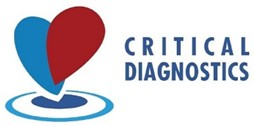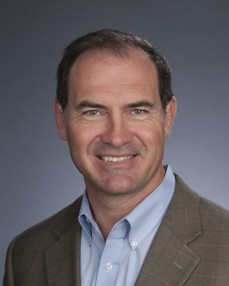|
Interview
conducted by: Lynn Fosse, Senior Editor, CEOCFO Magazine, Published – May 4,
2012
CEOCFO: Dr.
Snider, would you give us a brief overview of Critical Diagnostics?
Dr. Snider:
Critical Diagnostics is an early stage company that was formed to develop a
test for the cardiac biomarker protein called ST2, which has been shown to
be useful in providing prognostic and risk stratification information for
patients with cardiovascular diseases particularly heart failure. Critical
Diagnostics was formed to develop an in vitro diagnostic test, a laboratory
based test for this product; move that through the clinical regulatory
process and commercialize it. We have received regulatory approval both in
Europe and the US to market this test for clinical use.
CEOCFO:
Would you tell us about ST2 and why it is so important to be able to do the
assessment?
Dr. Snider:
ST2 is a protein that is expressed both as a cell surface receptor as well
as a soluble form. On the surface of cardiac cells, cardiomyocytes, when
those cells are subjected to injury or illness, that receptor responds to a
signal through an interleukin called interleukin 33. If that signal is
blocked when those cells are subjected to an injury or illness and do not
get that positive signal from interleukin 33, then those cells move into
apoptosis, necrosis and eventually fibrosis and remodeling. Cardiac
remodeling results in impaired cardiac function, which is by definition
heart failure. Soluble ST2, which is the protein that we measure, blocks
that signal of interleukin 33 to the receptor. Soluble ST2 is a different
gene product of the ST2 receptor gene and is expressed at higher
concentrations in patients who are progressing toward worsening disease. The
biology of their cardiac tissue is such that for some reason it goes into a
deterioration mode rather than a recovery mode. Soluble ST2 initiates a
series of cellular events that lead toward increasing fibrosis, cardiac
remodeling and impaired cardiac function. If left unchecked ultimately
leading to the patient’s death. In the clinical contextmeasuring ST2
identifies patients that are beginning this process. If you can identify
those patients then the physician has the opportunity to intervene earlier
and more effectively with appropriate therapeutics or device treatments to
reduce disease progression.
CEOCFO: Is there a test for it now that
you would be replacing or is this a new area?
Dr. Snider:
There are other cardiac biomarker tests but this is a new area. This is the
first clinical test for this marker, ST2, that has ever been available.
CEOCFO: What would be the indication?
Why would a physician decide to test with your array?
Dr. Snider:
This is not a diagnostic test. This is a test for assessing the prognosis or
the risk stratification of patients that have disease, such as in the
context of managing patients with heart failure. Our current indication for
use, as defined by the FDA, is for use as an aid in risk stratification of
patients with chronic heart failure. This is a population of patients that
doctors are already treating and the Census of heart failure patients in the
US is approximately 6 million. It is approximately twice that in Europe. The
challenge is that when patients are being treated, they are being treated
primarily for their symptoms, not necessarily for the biology of their
disease. If their symptoms change, it is usually a reflection of a
biological change that was happening some time previously. What ST2 provides
is that indication that the biology of the patient is changing prior to
their symptoms changing. For instance, before a patient with heart failure
becomes decompensated. That patient may show up in the emergency room or
clinic for treatment, because he or she is in distress or a patient that is
in early stages of disease, but does not have a compromised ejection
fraction so the ejection fraction not decreased. Therefore, remodeling is
not yet visible by echocardiography. ST2 can identify which patients are
progressing down that pathway. So, it can be used as an early indicator of
patients that should be monitored more closely for a potential change in
their status or to introduce treatment to delay the progression of the
disease.
CEOCFO: Would this eventually become
something standard to use for cardio patients?
Dr. Snider:
Yes, risk stratification of patients with heart failure is an accepted
clinical practice. And research projects that are currently in place, both
in the US and Europe, are being evaluated to better ascertain the
appropriate medical response to this assessment of risk. The objectives of
these projects include establishing what the optimum frequency is of testing
is and what treatment implementation or therapeutic changes should be made
to these patients and their care. This clinical adjustment is expected to
result in a delay in the patients’ progression of disease, keep them out of
the hospital and improve their quality of life.
CEOCFO: What is the product that
Critical Diagnostics will be bringing to the market; is it a device with a
razor/razor blade component?
Dr. Snider:
It is a laboratory test, a kit that can be performed in any standard medical
laboratory.
CEOCFO: Will expense be a factor?
Dr. Snider:
Certainly, it is not free, but we priced it very fairly and reflective other
tests in the category. In vitro diagnostic tests run anywhere from commodity
tests that are just a few dollars per test. For example, there is troponin,
which is right now reimbursed at around $10, and then there are natriuretic
peptides, such as BNP and NT-proBNP, which are reimbursed at $49. We do not
yet have an analyte specific reimbursement code for ST2 so we priced it at
$26.00.
CEOCFO: Critical Diagnostics has named
some distributors at Asia Pacific; would you tell us about that?
Dr. Snider:
Since receiving clearance from the FDA, we have been working globally. In
the US, we work directly. We also have relationships with some of the
reference testing laboratory companies, such as ARUP Laboratories in Salt
Lake City. The test has been available through them first as a research use
test and now as the FDA cleared test. We are establishing agreements with
additional reference testing laboratories companies in the US. We are also
selling directly with our own sales and marketing force in the US.
Internationally, we are leveraging with experts in individual countries;
some in Europe as well as in Asia. In Asia, we have engaged exclusive
distribution and marketing agreements with companies right now in China,
Korea, and in Indonesia. We are working on final stages of agreements with
the companies in several other Asian countries. By the end of this year, we
expect that we will have six or seven countries, with the major Asian
countries represented and moving forward.
CEOCFO: Development is a costly process;
is Critical Diagnostics funded to get to commercialization?
Dr. Snider:
Yes. The investment group that I worked with, that actually founded the
company, Carrot Capital Healthcare Ventures, has been extremely committed to
the development and success of the company. We have managed the company very
conservatively through this development cycle; minimizing our investment,
maximizing our return. We have kept the company very small with a modest
internal deployment force, leveraging significantly on resources that we
could obtain through subcontracting and through OEM. Our manufacturing has
been through OEM. Going forward, because we were so conservative in the
development cycle, they are very comfortable with the additional investment
necessary to move into commercialization and through the marketing efforts
that we are in process of executing. The revenue stream will offset a
significant amount of our expenses going forward.
CEOCFO: What is the potential market?
Dr. Snider:
The best thing that we can do is benchmark to the most comparable existing
test, the natriuretic peptides. Right now worldwide, the natriuretic peptide
tests market, the combination of BNP and NT-proBNP, is approximately $800
million. The clinical evidence that we have developed with ST2 is in the
context of patients with heart failure, which is the dominant use of the
natriuretic peptides. A significant amount of that business is in patient
management, which is exactly where ST2 should be used. We believe that the
opportunity for the Presage ST2 Assay is equal to, if not greater than the
current market for the natriuretic peptides.
CEOCFO: Why should investors pay
attention to Critical Diagnostics today?
Dr. Snider:
What differentiates the Critical Diagnostics product is that ST2 is
completely unique in the product. We already touched on the point that there
is not a product that it is replacing. It is a new clinical opportunity, a
new clinical value to the market for managing patients and making treatment
decisions for patients with cardiovascular diseases, heart failure as well
as other cardiovascular diseases. Therefore, it is a completely new
opportunity in the market space with very high clinical value. Critical
Diagnostics has exclusivity of intellectual property around the clinical
uses of this biomarker. We also have the proprietary reagents and components
of the test, so the test that is approved for clinical use can only be
produced with materials that we own and under our intellectual property.
Right now as a company, we are completely unencumbered by relationships with
any other partners. We have not entered into any licensing agreements for
instance with a major company in the IVD industry. We are certainly open to
discussions for partnership arrangements with large IVD companies, but we
have not yet entered into any of those agreements. Therefore, we have
complete latitude to consider any opportunity or structure that somebody
might be willing to present. Our investment group is extremely committed to
the success of the company and to this product. This test is comparable to
any of the other high success products such as the natriuretic peptides. The
experts in the field, the key opinion leaders that we work with, fully
believe that this test is potentially more valuable than the natriuretic
peptides, which are established and have proven value in managing patients
with cardiovascular diseases.
disclaimers
Any reproduction or further distribution of this
article without the express written consent of CEOCFOinterviews.com is prohibited. |

